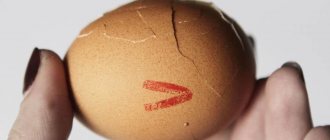People began to use eggs for food a very long time ago. This product was first appreciated by the people of India. Eating eggs in this country began back in 2.5 thousand years BC. Somewhat later, the Romans, and then residents of other European countries, began to eat them.
In Russian cuisine, eggs have long been used exclusively as a separate dish. Moreover, they prepared only on certain days. In our country, eggs began to be added to complex dishes no earlier than in the 19th century. Today this product is, of course, extremely popular in Russia. After all, eggs actually have many beneficial properties. However, they can show their best qualities only if they are stored correctly. Stale eggs, of course, should not be eaten under any circumstances. This product can cause very serious poisoning.
Temperature
It is believed that the optimal temperature for storing eggs is -2 - +20 °C. Under these conditions, this product will remain fresh for some time before consumption. Of course, like any other food, the shelf life of eggs directly depends on the ambient temperature. The lower it is, the longer you can avoid eating a store-bought product of this variety.
According to the requirements of GOST 31654-2012, table eggs can be stored:
- at temperatures from -2 to 0 °C no more than 90 days;
- at temperatures from 0 to +20 °C - maximum 25 days.
Table of storage temperature conditions
If you take into account suitable conditions and the number of days when storing eggs, you can correctly calculate the shelf life. Below is a table with these parameters.
| Temperature | Shelf life |
| 0-4 degrees | 25-90 days |
| 8-10 degrees | 10-14 days |
| 11-20 degrees | 5-7 days |
temperature conditions for storing raw eggs
Storage of boiled eggs
| Place | Shelf life |
| Fridge | 2-14 days |
| Freezer | 1 year |
| Room temperature | 2-3 days |
temperature conditions for storing boiled eggs
How long can you store in the refrigerator?
Almost every housewife has eggs in stock. And, of course, they are most often kept in the refrigerator. That is, in most cases, the temperature for storing eggs at home is +2-4 °C. Under such conditions, this product is able to maintain its freshness for a very long time. It is believed that you can keep eggs in the refrigerator for up to a month. In many cases, at this temperature they do not disappear even for 2-3 months.
Can eggs be stored at room temperature?
Sometimes it happens that it is not possible to put eggs purchased or collected in the chicken coop in the refrigerator. After all, such equipment, for example, can break down or be filled with other products.
Eggs, like, for example, milk or meat, are not considered perishable food. Therefore, in the absence of a refrigerator, they can be kept for some time, for example, in a kitchen cabinet at room temperature. Storage of eggs under such conditions, according to regulations, is possible for 25 days. However, the air in the room, of course, should not warm up above 20 °C.
Thus, experts give a positive answer to the question of whether eggs can be stored outside of the refrigerator. But still, the air temperature in the room when using this method should not exceed +25 °C. At this temperature, this product can stay fresh for a couple of weeks. Warmer air in the room can cause the incubation period to begin. Embryos, for example, develop in fertilized eggs already at a temperature of +36 °C.
Important
The above dates, of course, can only be valid for recently collected eggs. A store-bought product at home, of course, will have less shelf life. After all, quite a lot of time can pass from the assembly of such eggs to the moment they reach the counter. In addition, this product often remains in the supermarkets themselves for quite a long time.
At room temperature, eggs are, of course, best stored away from various heating appliances. For this product, you should find the coolest and preferably darkest place in your apartment. Most often, eggs in the house are kept in kitchen cabinet drawers or in the pantry.
When stored for a long time in the refrigerator or at room temperature, even if the GOST requirements for terms are met, this product still changes its qualities somewhat over time. Eggs are considered fresh only for 9 days after collection. If desired, such a product can be boiled either soft-boiled or in a bag. If the eggs were stored in the refrigerator or in the room for more than 9 days, it is still better to cook them only hard-boiled. This way you can eliminate the risk of poisoning.
How do fresh eggs differ from those collected long ago?
It is therefore clear how eggs should be stored. It is best to keep this product in the refrigerator at a temperature of 0 to +8 ° C. But how can you distinguish fresh eggs from those laid long ago? It's actually not too difficult to do this.
In order to find out when the eggs were collected at the poultry farm, you just need to look at the markings. Stamps with the date of production at such enterprises are placed on each egg.
Also, to determine the freshness of this product, you can look at it through an ovoscope. Many villagers who breed chickens and incubate chickens have such a device. If the yolk in a translucent egg is in the middle, it means it is fresh and can be eaten either soft-boiled or in a bag.
If under the ovoscope it is clear that there are dark spots in the yolk next to the white, this means that the egg has been lying somewhere for at least a week after it was laid. This product can also be eaten, but preferably only hard-boiled. Stale chicken eggs will not be visible under an ovoscope. Of course, it’s not worth eating such a product.
You can also immerse an egg in a glass of water to determine freshness. If it sinks and falls to the bottom, it means it was demolished just a few days ago. If the egg touches the bottom only with the sharp end, its “age” is about a week. Of course, such a product can also be considered fresh. If the egg sinks only to the middle of the glass, it is 2-3 weeks old and can still be eaten. If it floats on the surface, it means it is rotten and all that remains is to throw it away.
Factors that impair quality
Initially, fresh products without external defects . Long-term savings are possible if all unfavorable aspects are eliminated. The quality of stored protein deteriorates under the influence of the following factors:
- High humidity.
- Lack of ventilation.
- Temperature above +20°.
- Sudden temperature changes.
- Being near a source of strong odor (protein quickly absorbs foreign odors).
- Direct exposure to sunlight.
Boiled product
Of course, many housewives are interested in how to properly store boiled eggs. In its raw form, therefore, even at room temperature, such a product can remain fresh for a long time. Once boiled, eggs lose this property to some extent. After heat treatment, it is still advisable to store such food only in the refrigerator. Under room conditions, eggs in a whole shell will remain fresh for about 3 days (at a temperature not exceeding +20 ° C).
In the refrigerator at a temperature of +2 °C to +4 °C, such a boiled product can be kept for up to a week. At the same time, eggs can be stored in airtight containers under the same conditions for up to 14 days.
The exception in this case is soft-boiled eggs. They spoil much faster than hard-cooked ones. In room conditions, such eggs can remain for no longer than 24 hours until they lose freshness. They can be stored in the refrigerator for a maximum of 2 days. That is why at Easter it is recommended to boil eggs exclusively soft-boiled. After all, the Easter eggs will have to lie on a plate with Easter cake for quite a long time. Soft-boiled eggs under such conditions will most likely disappear. In any case, it will be unsafe to eat them.
Hard-boiled Easter eggs, by the way, can be stored a little longer than regular boiled ones. The fact is that the paint used to decorate Easter eggs clogs the pores in the shell. As a result, microorganisms that contribute to the deterioration of the contents of the egg cannot penetrate inside it longer. Easter eggs can be stored for up to 4 days.
If necessary, a similar method can be used to keep regular boiled eggs fresh longer. To extend their shelf life, their shells simply need to be lubricated with vegetable oil.
... and additional manipulations
There are other ways to determine the freshness of an egg. For example, measuring temperature in different parts of it or ultraviolet scanning. But they are rather from the realm of complex experiments. But the following four methods are quite suitable for independent “revision”.
- Shake. The good thing about this method is that it can be used without leaving the counter. You need to bring the egg to your ear and shake it. “Chatterbox”, unsuitable for consumption, is characterized by “squelching”. The explanation is simple - during prolonged storage, the inner membrane moves away from the shell, the contents of the egg dry out and begin to dangle. The absence of extraneous sounds is an indicator of freshness.
- Smash. You will need a flat plate into which the egg is broken and the condition of its contents is assessed. A fresh egg has a yolk that is convex, round, and holds its shape, and the white is viscous and dense. A flat yolk and a watery, runny white indicate an “aged” egg.
- Clear. Boiled fresh eggs have one drawback: they are not easy to peel. The shell comes off unevenly, along with part of the protein. Fresh peeled eggs look unsightly and are not suitable for decorative purposes. A boiled, sitting egg is easy to peel and smooth. At its end, where there was air, after cooking there is always a characteristic depression.
- Smell. To check if an egg is rotten, just smell it. The specific rotten “smell” is the smell of hydrogen sulfide, a gas that appears due to the rotting of protein. The nose will unmistakably identify a hopelessly spoiled product.
By smell you can also check the freshness of boiled eggs, which have a shorter shelf life than fresh ones. Their shells are porous, which means they are even more vulnerable to air and bacteria. In reviews, some housewives advise freezing pre-peeled eggs. But professional chefs do not recommend doing this, since freezing destroys their cellular structure, the protein turns into “rubber” after thawing, and the shelf life of the product, on the contrary, decreases.
If the shelf life of eggs is in doubt, it is better to avoid eating them raw, as well as barely fried fried eggs, soft-boiled dishes and scrambling - a Scottish “scrambled” omelette. By the way, the modern menu of many foreign restaurants contains information about the presence of raw or undercooked eggs in dishes, which is associated with the fear of visitors of becoming infected with salmonellosis.
Video on the topic
How long do quail eggs last?
This product is also quite popular among Russian consumers. Quail eggs are more expensive than chicken eggs. However, they contain more vitamins and substances beneficial to the human body. Quail eggs, like chicken eggs, can be stored for quite a long time.
At temperatures from 0 to +8 °C this product remains fresh for up to 30 days. These are the GOST standards for quail eggs. However, practice shows that this product can retain its freshness much longer. Thus, it is considered quite safe for quail eggs to be stored at temperatures from 0 to +4 °C in the refrigerator for up to 2 months.
Useful properties of boiled eggs
In addition to the fact that eggs are included in all kinds of dishes, due to their nutritional value and versatility, they are also very useful.
- Eggs are a source of protein necessary for building the body and functioning of all its systems.
- The product is rich in many useful substances. For example, vitamin A plays an important role in strengthening the eyesight, and vitamin B is good for the nervous system.
- The trace elements contained in eggs are essential for human health. For example, potassium helps the functioning of the heart and blood vessels, and calcium strengthens bone tissue.
- The organic compound choline affects liver function, improves memory, and also strengthens hair follicles.
- Vitamin D is thought to play a role in preventing breast cancer in women.
A useful product is always at hand in every home.
Especially a lot of eggs need to be boiled for the holiday.
A natural question arises: how to store boiled eggs longer?
Egg products
GOST standards, of course, must be observed for such a semi-finished product. Dry egg products should be stored:
- at temperatures up to +20 °C - maximum 6 months;
- up to +4 °C - no more than 24 months.
According to the rules, liquid egg products are stored:
- at temperatures up to +4 °C - maximum 24 hours;
- up to -18 °C - no more than 15 months;
- up to -12 °C - maximum 10 months.











